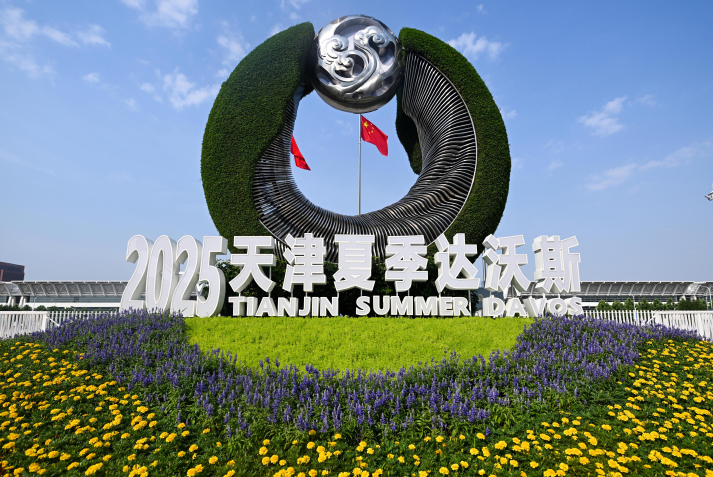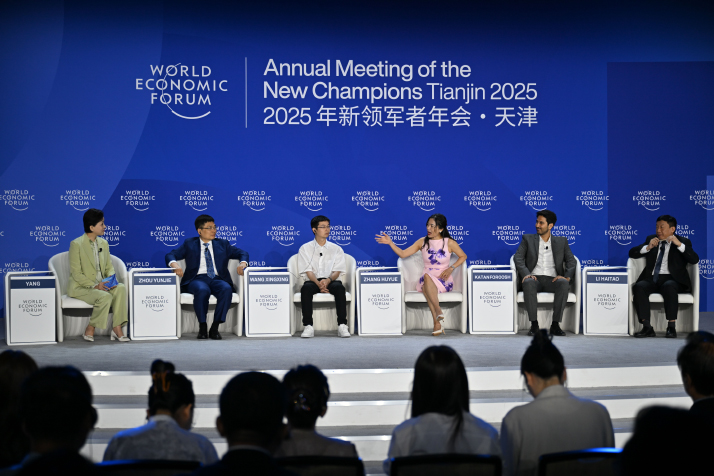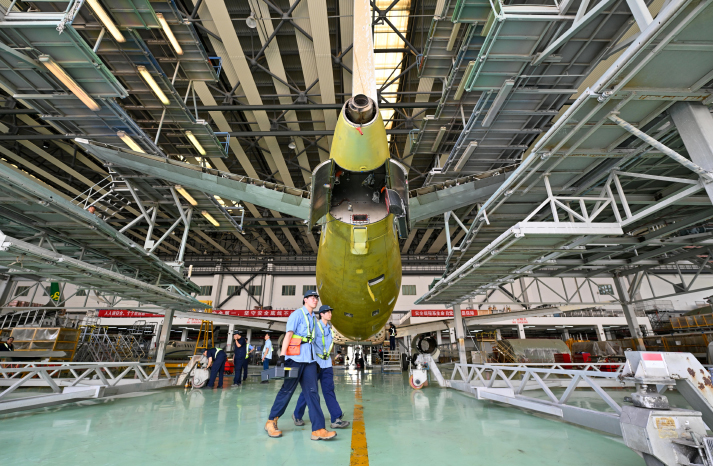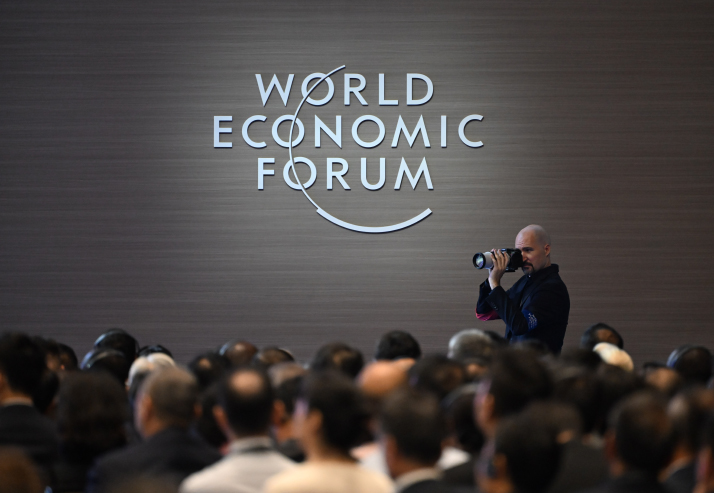| Business |
| The Tianjin takeaway | |
|
|
 The 2025 Summer Davos forum is held in Tianjin from June 24 to 26 (XINHUA)
The National Convention and Exhibition Center in Tianjin, which hosted the 2025 Summer Davos forum on June 24-26, is powered by rooftop solar panels. According to the State Grid Corp. of China, this edition of the forum achieved a 100-percent green power supply for its venues, utilizing a total of 800,000 kilowatt-hours of renewable electricity, equivalent to saving about 300 tons of standard coal and cutting approximately 600 tons of carbon emissions. The venue also utilizes sponge city technologies that integrate natural processes and distributed storage to manage storm water. Additionally, hundreds of new-energy vehicles facilitated green transportation for forum participants. These achievements embody China's advancement in one of the key areas spotlighted by the global gathering—new energy and materials. The 2025 Summer Davos, officially known as the 16th Annual Meeting of the New Champions of the World Economic Forum (WEF), was themed Entrepreneurship for a New Era. Around 1,800 participants from over 90 countries and regions explored how entrepreneurship and emerging technologies can boost global economic growth amid challenges. According to the WEF, the world is undergoing a fundamental economic transformation as geopolitics, technology, sustainability and demographic changes reshape traditional growth engines. Complex and shared challenges in development and climate change require urgent cooperation, innovative thinking and an entrepreneurial spirit. Unlike the annual WEF meeting held in Davos, Switzerland, every January, the Summer Davos, established in 2007 through a collaboration between the WEF and China, places greater emphasis on the future of business and technological advancement. What began as an initiative to spotlight emerging economies and future-oriented businesses has grown into a global platform for economic dialogue. Tong Jiadong, a professor of international trade at the School of Economics, Nankai University in Tianjin, who serves as the long-term Chinese agenda research leader for the Tianjin Summer Davos, said the forum has turned into an event facilitating international exchange and cooperation, forecasting global economic growth trends and identifying key opportunities for expansion in the global economy.  A sub-forum titled Understanding China's Approach to AI during the 2025 Summer Davos Forum on June 26 (XINHUA)
China's role In his speech at the opening plenary of the 2025 Summer Davos on June 25, Chinese Premier Li Qiang said China is developing itself into a super-sized consumption powerhouse on the solid foundation of a manufacturing powerhouse, and it will continue to deepen its integration into and connectivity with the global market. China is "probably the most remarkable story of transformation" in recent decades, according to former British Prime Minister Tony Blair at a session of the forum. He urged countries to seek understanding and remain engaged with China, rather than isolate it. In 2024, China's GDP grew 5 percent year on year to more than 134 trillion yuan ($18.82 trillion), contributing about 30 percent to global economic growth, with the country targeting a growth rate of around 5 percent in 2025. As a major trading partner for over 150 countries and regions, China saw its total goods imports and exports increase by 2.5 percent year on year in the first five months of 2025. The country also saw a surge in global visitors boosted by visa-free entry and transit policies. A recent World Bank report indicated that China's economy maintained robust growth momentum in early 2025, supported by proactive monetary and fiscal policies to counter global trade uncertainties. U.S. financial institutions JPMorgan Chase and Goldman Sachs have also revised their growth forecasts of China's economic growth upward. Innovation has been a key driver of China's economic growth. Ranking second globally, China's research and development expenditure increased by 8.3 percent year on year in 2024. The country has seen booming innovations and applications of AI and robotics. China has rolled out a series of measures to attract foreign investment and improve the business environment. In 2024, 59,000 new foreign-invested enterprises were established in China, up 9.9 percent year on year. The country attracted an annual overseas investment of over 1 trillion yuan ($139 billion) for three consecutive years from 2021 to 2023. According to the WEF, the global growth outlook has reached its lowest point in decades. Boosting global cooperation requires greater commitment and creativity than ever before. The international economic and trade landscape is undergoing a profound change. The global community needs to safeguard free trade and multilateralism, and promote the stable development of the world economy, Li said. China's economy, with steady growth, will provide strong support for the recovery of the world economy. It will keep improving the business environment for global businesses to survive and thrive in the Chinese market, he added.  An airplane undergoes bonded maintenance services at Tianjin Haite Aircraft Engineering Co. in the China (Tianjin) Pilot Free Trade Zone on June 18 (XINHUA)
Tech-driven growth During the event, cutting-edge products like humanoid robots and brain-computer interfaces were major attractions. Fitow, a Tianjin-based intelligent manufacturer, was one of the enterprises attending the forum this year. According to the company, it adopts AI technology to analyze over 30 types of data in real time, including equipment operation, vibration and temperature, and perform digital twin system simulations within just one minute. This effectively avoids issues such as downtime and has already been applied in auto parts production for multiple automotive manufacturers across China. Based in Chongqing, southwest China, Pharscin Pharma develops targeted cancer therapies through AI. It said AI-powered big data allows it to quickly identify candidates, and improve research and development efficiency, shortening trial times from two to three years to six months. Global companies are riding the tech tide in China and casting vote in the Chinese market. Schneider Electric, a French multinational company specializing in energy management, is optimistic about the Chinese market as it is vast and offers a strong industrial foundation. The development of new quality productive forces is accelerating the creation of innovation-driven digital and green productivity, providing great opportunities for Schneider Electric, the company said. New quality productive forces refer to the shift toward innovation-driven growth, technological advancement and high-quality development in various sectors of the Chinese economy. The company has launched an End-to-End Lighthouse Factory in Shanghai, which uses AI-powered digital solutions to cut make-to-order time by 67 percent and boost production efficiency by 82 percent. In late May, GE Healthcare, a subsidiary of Fortune 500 U.S.-based company General Electric, received approval to launch global bonded maintenance services for high-end medical devices at its facility in the China (Tianjin) Pilot Free Trade Zone (FTZ). China's pilot FTZs are designated areas where special economic policies and regulations are tested to promote trade liberalization, investment and economic development. Chen Heqiang, Vice President of GE Healthcare China, told Xinhua News Agency that bonded maintenance facilitates sustainable upgrades and remanufacturing pathways for high-performance medical equipment. The company plans to invest an additional 500 million yuan ($69.7 million) in its Tianjin base to reinforce its global service capabilities. Chinese enterprises are also seeking global cooperation in overseas markets. Over the years, Bloomage Biotech, for instance, has established a comprehensive global supply chain network across more than 70 countries and regions, including the U.S., France, Japan and the Republic of Korea. "Despite complex uncertainties, Bloomage Biotech has been seeking to reshape global competition rules through open innovation," Zhao Yan, Chairman and General Manager of the company, said at the forum.  A photographer captures the crowd at the 2025 Summer Davos on June 25 (XINHUA)
Green goals Sustainability was a key topic of the forum this year. Green nitrogen fixation has been named among the WEF's Top 10 Emerging Technologies of 2025, alongside innovations like collaborative sensing and autonomous biochemical sensing. Today, China stands as the global leader in renewable energy investment. The nation has pioneered transformative technologies in the fields of batteries and electric vehicles, creating millions of high-quality jobs in these future-oriented sectors, according to Gim Huay Neo, Managing Director of the WEF, at the forum. "This is an area where there's a lot of scope for us to learn from China's experience, where there could be constructive partnerships between China and other parts of the world to also support the global energy transition," Neo said. U.S. industrial conglomerate Honeywell has been participating in the Summer Davos since 2023. Yu Feng, President of Honeywell China, said that the size, resilience and innovation vitality of the Chinese market have laid a solid foundation for multinational enterprises to set foot in China, and the country's prowess in digital economy and low-carbon development has carved out broad space for businesses. Honeywell has strengthened its partnerships with Chinese enterprises in sectors including automation, energy transition and aviation. It now operates several national- and provincial-level green factories in China. The company has been cooperating with a local firm in Jiangsu Province to produce a sustainable aviation fuel facility. This facility converts used cooking oil into high-quality sustainable aviation fuel, helping to reduce carbon emissions in the aviation industry. Honeywell will continue to improve fuel use efficiency and reduce aviation carbon emissions through innovative technologies. It will further explore new opportunities in the Chinese market related to shipping, energy storage, biotech and smart city solutions, Yu said. BR Copyedited by Elsbeth van Paridon Comments to lixiaoyang@cicgamericas.com |
|
||||||||||||||||||||||||||||||
|